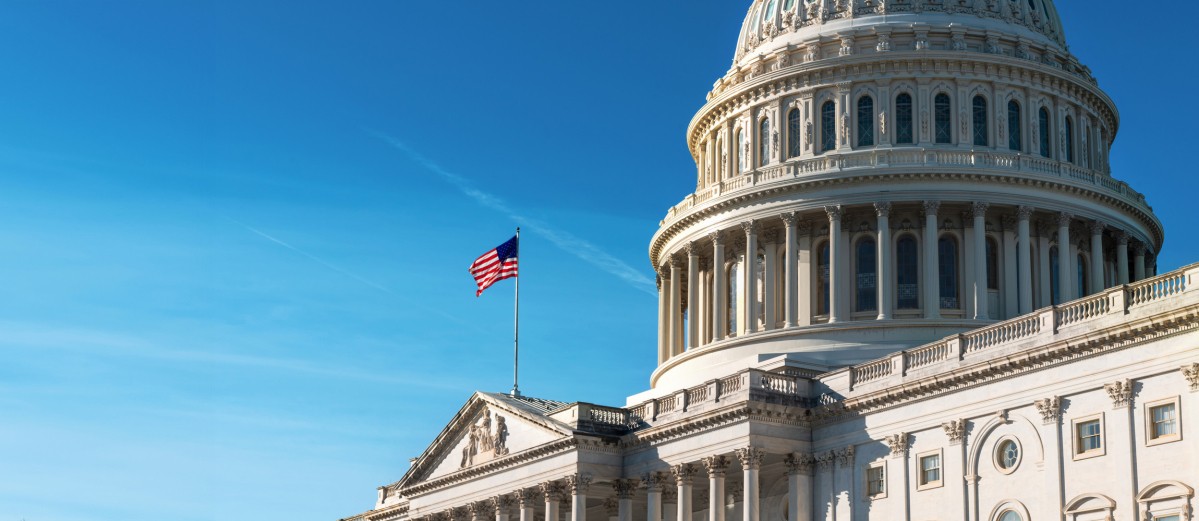

US Election –
What Trump’s US election victory means for markets
In a race that remained on a knife edge right up until polling day, Donald Trump has been re-elected for a historic second presidency. What might this mean for markets?
Trump re-elected with Senate Control
How are US Equities impacted?
As with the 2016 election, markets have responded positively to a Trump election overnight with the S&P 500 up on the day. Trump’s manifesto is pro-business, with promises to not only make his 2017 tax cuts permanent, but also to go further and reduce corporate taxes from 21% to 15%. Trump is also looking to cut a number of business regulations. Interestingly, we are seeing smaller US companies outperform the S&P 500 as the market perceives Trump’s policies as positive for US domestic growth. This is again a similar market reaction to 2016, and we could see equity market gains continue to broaden out, no longer just being driven by big US technology companies.
What does Trump’s re-election mean for US fiscal policy?
Trump’s economic policy is expected to increase US Federal debt further, primarily driven by extending his 2017 tax cuts. There are no significant spending cuts in his plans to pay for this. Fiscal prudence has become less of an issue in American politics, and it is likely that we will see the already historic US government deficit widen further.
The consequence of wider fiscal deficits is higher government borrowing levels in the future, which will create a headwind for bond returns. In the lead up to the election we have seen US Treasury yields increase substantially and, yields continued to rise further today. It is important to note, though, that bonds have repriced significantly since 2022 and are now better valued. While fiscal profligacy remains a concern, we still believe they serve an important function for client portfolios.
How could Trump’s policies impact US inflation?
Exit polls suggest that inflation was a key concern for voters, and Trump is seen as the more capable candidate when it comes to the economy. However, his policies are broadly expected to increase the upside risks to US inflation.
Trump’s expansionary fiscal policy will lead to higher demand in the US economy, which is already growing strongly. This is likely to result in higher inflation, as labour supply is becoming increasingly scarce. This scarcity of labour is likely to be exacerbated with Trump’s anti-immigration policies.
One of the pillars of Trump’s campaign has been his intent to impose tariffs on all imports to the US. Higher tariffs are likely to be passed onto consumers, further pushing up inflation.
Higher inflation affects not only the average US consumer, limiting how far their dollars stretch, but also US monetary policy. It is expected that if inflation does rise again, the Federal Reserve’s (Fed) current rate-cutting trajectory may slow, or even reverse, if rates need to rise again. The effect of this will be to keep borrowing costs, for both businesses and households, elevated and this could be restrictive for US growth.
During the last few years, Trump has made no secret of his dissatisfaction with Fed policy and there are also concerns that he may make moves to impinge the independence of the Fed from the White House. Based on our research, the barriers for this are extremely high.
Will Trump’s economic policies strengthen or weaken the US Dollar?
If the US Federal Reserve rate remains higher than global peers, as would be the case if US inflation reignites on the back of Trump’s fiscal policies, this will be supportive of the US Dollar. Depositors will opt to hold US Dollars over other currencies, where possible, to achieve a superior rate.
Since the polls closed and results began to tip in Trump’s favour, we have already seen the US Dollar strengthening against global currencies, with GBP/USD reaching 1.29 at the time of writing and EUR/GBP reaching 1.07.
What happens next?
In terms of immediate impact, the biggest boon for markets is the certainty of a clear mandate for a candidate. Historically, markets tend to be positive in the 4-6 weeks post-election on the due to this certainty, regardless of the winning party. Another Trump presidency is seen as pro-markets, which further exacerbates this effect.
Trump has secured a second term on ambitious promises similar to those of his first. The key question now is how much he will deliver on these commitments when he returns to the White House in 2025. While we have seen market moves in both the lead up and on the day of the election, the most important issue for us is the macroeconomic backdrop. This is what drives markets in the long-term, and so this is where our focus continues to lie.
Further reading
Harris Vs Trump – what their policies mean for your portfolio
With the US election too close to call, we look at some of the key economic policies from both candidates, their potential impact on the markets, and how we approach our investment decisions.
Market impact: Investor insights for a year of global elections
We are over a third of the way through the ‘Election Year’ that is 2024, with almost 50% of the world’s population heading to the polls.
Autumn Budget 2024: Key Outcomes
A summary of the key outcomes that could impact high-net-worth individuals and businesses.
Author -

Gabriella Macari
Senior Investment Manager
Gabriella Macari, Senior Investment Manager at Arbuthnot Latham, joined the bank in 2019 and has more than 11 years of experience in the investment and wealth management industry. Gabriella played a pivotal role in the development and launch of our Sustainable Portfolio Service in 2021 and led our research coverage of the commercial property market from 2020 to 2022.
She holds the title of Chartered Wealth Manager, Investment Advice Diploma and the Private Client Investment Advice and Management qualification. She holds a BSc (Hons) in Economics from the University of Bath.
Outside of work, Gabriella enjoys cooking, reading, and finding opportunities to practice her Italian. She is also a keen runner and a lifelong Formula 1 fan.
DISCLAIMER
This communication should be considered a marketing communication. It has not been prepared in accordance with legal requirements designed to promote the independence of investment research. It is for information purposes only and does not constitute advice, a solicitation, recommendation or an offer to buy or sell any security or other investment or banking product or service. You should seek professional advice before making any investment decision. The value of investments, and the income from them can fall as well as rise, and may be affected by exchange rate fluctuations. Investors could get back less than they invest. Past performance is not a reliable indicator of future results. The tax treatment of investments depends upon individual circumstances and may be subject to change.
The contents of this communication are based on opinions or conditions as at the date of writing and may change without notice. To the extent permitted by law or regulation, no warranty of accuracy or completeness of this information is given and no liability is accepted for its use or reliance on it.